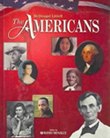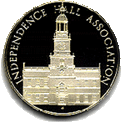American History Iby Matthew Caggia
- Unit 1A: Colonization & the 13 Colonies
- Unit 1B: Coming of the Revolution
- Unit 2A: Confederation & Compromise
- Unit 2B: The New Nation
- Unit 3: Sectionalism & Nationalism
- Unit 4: Reshaping the Nation
- Unit 5: Coming of the Civil War
- Unit 6: The Civil War
- Unit 7: Reconstruction
- Textbook
Unit 3: Sectionalism & Nationalism
Chapter 7
The New Nation faces new problems, but these are internal. The struggle between States' Rights and National Supremacy is the political debate of the day, and will pretty much continue to be to the Civil War and beyond. The nation will also face the growing pains associated with westward expansion. How nice, Jefferson bought the Louisiana Purchase, now what? Settling that land will prove more challenging than anticipated, and relocating the people who already live there will makes us look back and question the ethics of the how it was done.
Study Tools
Slideshows
The slideshows are best if viewed full screen.
The War of 1812
Regional Economies
The Industrial Revolution and Henry Clay's American System in American History.
The Marshall Court
The Age of Jackson
Online Textbook Resources
 |
"The Americans" TextbookThese pages contain the links to the online content for student practice. It includes Chapter Overviews, Web Activities, Self-Check Quizzes, ePuzzles and Games, Vocabulary Flashcards, Charts in Motion (to accompany diagrams in the textbook), and Interactive Graphic Organizers.
|
|
USHistory.org Free Online TextbookEach link is to the beginning of a chapter. There are several sections within each chapter; I would like to link to each section, however it becomes too cumbersome for the webpage. Instead, click "Next" on each page to get to the next section of the online textbook. |  |
|
Vocabulary
Link to Quizlet! Vocabulary is the key to understanding any subject. Once you can break down the barrier of language the ideas and concepts are wide open. Here you can find the vocabulary for the unit to practice by using online flash cards and by practicing online generated vocabulary quizzes.
- Unit 3 Vocabulary Quiz on Quizlet
Practice your vocabulary for Unit 3 by trying this quiz of the unit's vocabulary.
When you get to the Quizlet Quiz page, you can adjust what type of quiz to take by using the check boxes on the right.
Videos!
The Presidents: James Madison
Watch the video and answer these multiple choice questions.
The Presidents: James Monroe
Watch the video and answer these multiple choice questions.
The Presidents: John Quincy Adams
Watch the video and answer these multiple choice questions.
The Presidents: Andrew Jackson
Watch the video and answer these multiple choice questions.
"The Battle of New Orleans" by Johnny Horton
I remember this song from my childhood. Not that it was new when I was a child, this is my parents' generation, but it was one of our favorites to play in the jukebox. Yep, believe it or not, we had a jukebox in our basement that played 45 rpm records. For a little kid, that song was really catchy and the march element to it made it all the more fun to play over and over. This song is a fun telling of the Battle of New Orleans. From it you can pick up some of the little things that are historical. Try and picture it as you hear the lyrics.
Crash Course American History #11: The War of 1812
From the publisher:
John Green teaches you about the War of 1812. The War of 1812 was fought between the United States and its former colonial overlord England. It started in, you guessed it 1812. The war lasted until 1815, and it resolved very little. John will take you through the causes of the war, tell you a little bit about the fighting itself, and get into just why the US Army couldn't manage to make any progress invading Canada. And yes, Canadians, we're going to talk about the White House getting burned down. The upshot: no territory changed hands, and most of the other bones of contention were solved prior to the actual war. Although nothing much changed for the US and England, the Native Americans were the big losers. Tecumseh was killed, and the Indian tribes lost a lot of territory.
"The Forgotten War of 1812"
This PBS documentary explains the complexities of the War of 1812. Not only was it a war that involved the Americans and the British, but it had implications for Napoleon and his efforts to liberate and unite Europe.
From the publisher
The war of 1812 was the last war fought between America and Britian, the conflict envoloped Americans, Britians, canadian colonists, and Indians. The war was fought around the same time Napoleon invaded Russia and lasted from 1812 to 1814 killing thousands of solders, civilians, and untold destruction of property and damaging relations between America,Britain and canada to this very day.
Crash Course American History #12: The Market Revolution
From the publisher
John Green teaches you about the Market Revolution. In the first half of the 19th century, the way people lived and worked in the United States changed drastically. At play was the classic (if anything in a 30 year old nation can be called classic) American struggle between the Jeffersonian ideal of individuals sustaining themselves on small farms vs. the Hamiltonian vision of an economy based on manufacturing and trade. I'll give you one guess who won. Too late! It was Hamilton, which is why if you live in the United States, you probably live in a city, and are unlikely to be a farmer. Please resist the urge to comment about this if you live in the country and/or are a farmer. Your anecdotal experience doesn't change the fact that most people live in cities. In the early 19th century, new technologies in transportation and communication helped remake the economic system of the country. Railroads and telegraphs changed the way people moved goods and information around. The long and short of it is, the Market Revolution meant that people now went somewhere to work rather than working at home. Often, that somewhere was a factory where they worked for an hourly wage rather than getting paid for the volume of goods they manufactured. This shift in the way people work has repercussions in our daily lives right down to today. Watch as John teaches you how the Market Revolution sowed the seeds of change in the way Americans thought about the roles of women, slavery, and labor rights.
Crash Course American History #13: Slavery
From the publisher
John Green teaches you about America's "peculiar institution," slavery. I wouldn't really call it peculiar. I'd lean more toward horrifying and depressing institution, but nobody asked me. John will talk about what life was like for a slave in the 19th century United States, and how slaves resisted oppression, to the degree that was possible. We'll hear about cotton plantations, violent punishment of slaves, day to day slave life, and slave rebellions. Nat Turner, Harriet Tubman, and Whipped Peter all make an appearance. Slavery as an institution is arguably the darkest part of America's history, and we're still dealing with its aftermath 150 years after it ended.
Crash Course American History #14: Age of Jackson
From the publisher
John Green teaches you about the presidency of Andrew Jackson So how did a president with astoundingly bad fiscal policies end up on the $20 bill? That's a question we can't answer, but we can tell you how Jackson got to be president, and how he changed the country when he got the job. Jackson's election was more democratic than any previous presidential election. More people were able to vote, and they picked a doozie. Jackson was a well-known war hero, and he was elected over his longtime political enemy, John Quincy Adams. Once Jackson was in office, he did more to expand executive power than any of the previous occupants of the White House. He used armed troops to collect taxes, refused to enforce legislation and supreme court legislation, and hired and fired his staff based on support in elections. He was also the first president to regularly wield the presidential veto as a political tool. Was he a good president? Watch this video and draw your own conclusions.
The Marshall Court for Dummies
From the Publisher
HipHughes breezes through the three essential Marshall court cases, Marbury v Madison, McCulloch v Maryland and Gibbons v Ogden. Simple learnin', not meant for in depth course work, just enough so you don't look like a dummy.
Links
- Andrew Jackson and the Nullification Crisis
Use the link above to access the activity. You will need the login provided by your teacher/school in order to access the activity on SAS Curriculum Pathways. After logging in, use the Quick Lookup (QL#) 1261. The "Practice" handout required for the activity can be printed below.
This activity will guide you through Andrew Jackson and the Nullification Crisis instigated by John C. Calhoun of South Carolina. Sometimes overlooked, this crisis nearly resulted in several southern states seceding from the United States.
Jackson & Nullification Online Activity